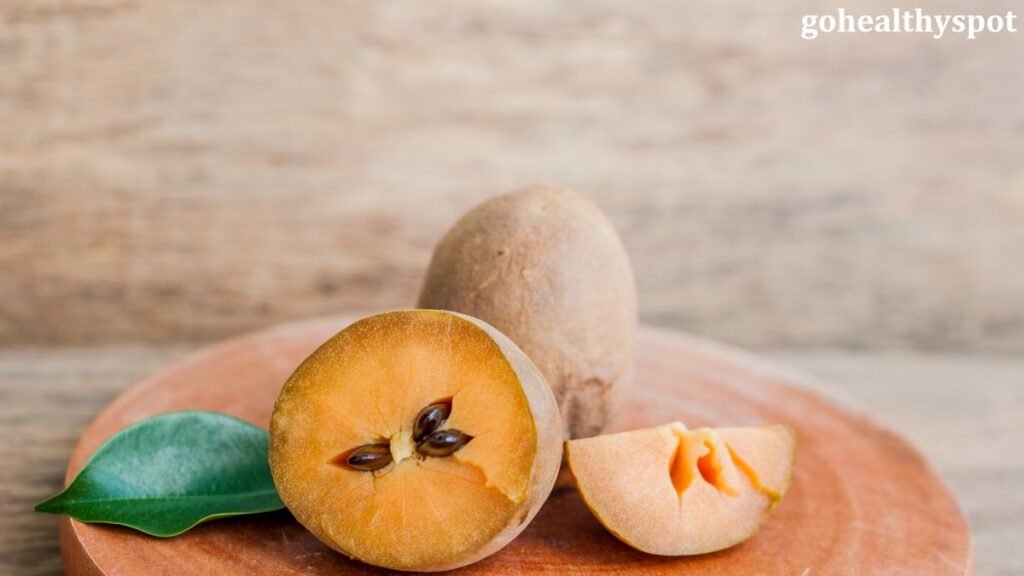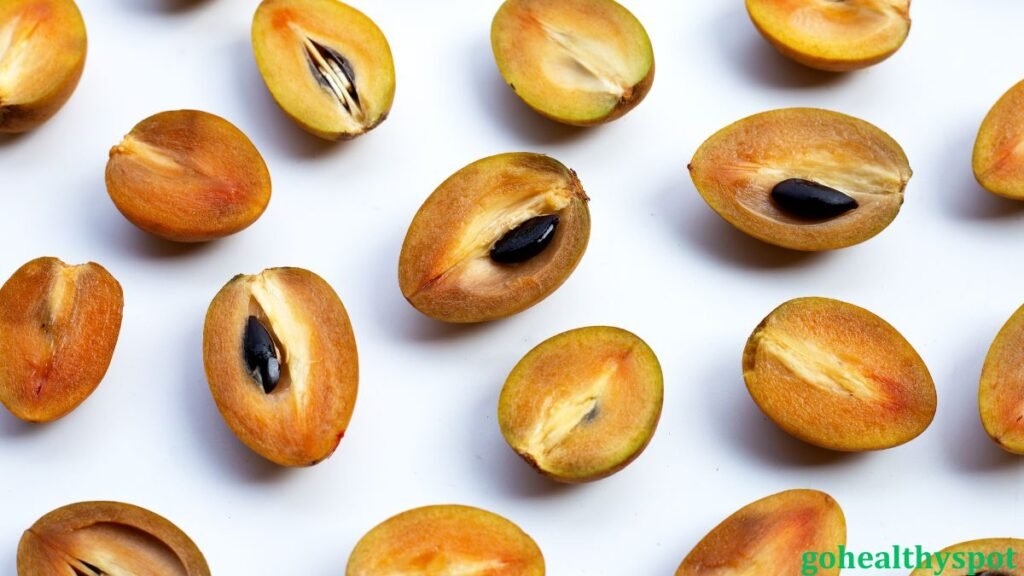key topics of Sapota Fruit Benefits
Introduction
Scientific Name of Sapota : Manilkara zapota.
Sapota, also known as sapodilla, is a tropical fruit renowned for its sweet, custard-like texture and distinctive aroma. Native to Central America, this delicious fruit has been cherished for centuries for its nutritional benefits and culinary versatility. Packed with essential vitamins, minerals, and antioxidants, sapota offers a delightful and healthy addition to your diet. Let’s explore the sapota fruit benefits and nutritional value of this tropical gem.
Sapota fruit Benefits for Skin :
Sapota, a tropical fruit known for its creamy texture and sweet flavor, offers numerous benefits for the skin. Rich in antioxidants like vitamin C, sapota helps protect the skin from harmful free radicals that contribute to premature aging. The vitamin C also promotes collagen production, improving skin elasticity and reducing the appearance of fine lines and wrinkles. Additionally, sapota contains potassium, which helps regulate fluid balance in the body, preventing skin dryness and maintaining a healthy complexion.
Furthermore, sapota is a good source of fiber, which aids in digestion and can indirectly benefit the skin by reducing inflammation and promoting overall skin health. The fruit’s natural sugars can also provide a boost of energy, which can positively impact skin cell renewal and vitality. Incorporating sapota into your diet can be a delicious and effective way to nourish your skin and maintain a youthful glow.
Sapota Fruit Benefits for Male and Female :
Chikoo Benefits for Men:
Sapota, also known as chikoo, is highly beneficial for men’s health. It’s rich in dietary fiber and essential nutrients like potassium, iron, and vitamins A and C, which help boost energy levels and promote overall physical stamina. The natural sugars in sapota provide a quick energy boost, making it a great snack for active men or those involved in physical labor or exercise.
Additionally, sapota has antioxidants that help reduce inflammation and support heart health, potentially lowering the risk of cardiovascular diseases, which is particularly important for men as they age. Its high vitamin C content also strengthens the immune system and promotes healthier skin.It is a good source of fiber, which aids digestion and can help prevent constipation. Chikoo also contains essential nutrients like potassium, which helps regulate blood pressure and muscle function.
Chikoo Benefits for Women:
For women, chikoo offers multiple health benefits, particularly in supporting skin health and digestion. Rich in antioxidants like vitamin E, sapota helps slow down skin aging by combating free-radicals, promoting a youthful glow. The fruit’s fiber content aids in digestion, which can be especially helpful for women dealing with hormonal changes that affect digestion. Sapota is also a good source of iron, which helps prevent anemia—a condition more common in women, especially during menstruation.
Its calcium content can further support bone health, reducing the risk of osteoporosis in later years.the fruit’s potassium content helps maintain healthy blood pressure and supports heart health. For women who are trying to conceive, chikoo can be beneficial due to its folate content, which is essential for fetal development. Overall, chikoo is a nutritious and delicious fruit that can contribute to a woman’s overall well-being.

Sapota Fruit Benefits in Pregnancy :
- Rich in Nutrients: Sapota contains essential nutrients like vitamins A, C, and B-complex, along with minerals like calcium, iron, and magnesium, which support overall health during pregnancy.
- Boosts Energy: Its natural sugars provide a quick energy boost, helping pregnant women combat fatigue and tiredness, which is common during pregnancy.
- Improves Digestion: The high fiber content in sapota helps prevent constipation, a common issue during pregnancy, by promoting smoother bowel movements.
- Strengthens Immunity: Sapota is rich in antioxidants and vitamin C, which help boost the immune system, protecting both mother and baby from infections.
- Relieves Nausea: The fruit is known for its calming properties, which can help reduce nausea and morning sickness, especially in the early stages of pregnancy.
- Prevents Anemia: Sapota contains iron, which is essential for increasing hemoglobin levels and preventing anemia, a common condition during pregnancy.
- Promotes Healthy Fetal Growth: The vitamins and minerals in sapota support the development of the baby’s bones, tissues, and overall growth.
- Reduces Inflammation: Its anti-inflammatory properties can help reduce swelling and discomfort, which many women experience during pregnancy.
- Hydrates the Body: Sapota has a high water content, helping pregnant women stay hydrated and maintain fluid balance.
- Relieves Stress: The fruit’s calming effect on the nervous system can help alleviate stress and anxiety, promoting better mental well-being during pregnancy.
Sapota Fruit Benefits for Baby :
Sapota, a tropical fruit known for its creamy texture and sweet flavor, offers several benefits for babies. It is a good source of fiber, which can help regulate digestion and prevent constipation. Additionally, sapota contains vitamins and minerals, including vitamin C, which supports immune function and iron, which is essential for healthy blood.
The fruit’s natural sugars can provide a gentle energy boost for growing babies. However, it is important to introduce sapota to babies gradually and in small quantities to monitor for any allergies or sensitivities. As with all new foods, it is recommended to consult with a pediatrician before introducing sapota to your baby’s diet.
Disclaimer : This article provides general information and should not be considered as medical advice. It’s essential to consult with a healthcare professional for any health concerns or before making significant changes to your diet or lifestyle.
Sapota Fruit Side Effects :
Sapota, while generally safe to consume, can cause side effects in some individuals. Excessive consumption of sapota can lead to diarrhea due to its high fiber content. Additionally, the fruit’s natural sugars may contribute to weight gain if consumed in excess. Individuals with diabetes should exercise caution when consuming sapota, as the fruit’s sugar content can affect blood glucose levels. Allergic reactions to sapota are rare, but it is possible for some people to experience symptoms such as skin rashes, itching, or difficulty breathing. If you experience any adverse effects after consuming sapota, it is recommended to consult with a healthcare professional.

Nutrition and Vitamins in Sapota :
Sapota, a tropical fruit known for its creamy texture and sweet flavor, is a nutritional powerhouse. Sapota is also rich in vitamins and minerals, including vitamin C, which is an antioxidant that helps protect cells from damage. Additionally, the fruit contains potassium, which is essential for maintaining healthy blood pressure and heart function. Sapota also provides a small amount of calcium and magnesium, both of which are important for bone health. Overall, sapota is a nutritious fruit that can contribute to a balanced and healthy diet.
| Nutrient | Amount |
| Calories | 85 kcal |
| Total Fat | 0.4 g |
| Protein | 0.6 g |
| Carbohydrates | 21 g |
| Fiber | 1.4 g |
| Sugar | 17 g |
| Vitamin C | 15% |
| Vitamin A | 5% |
| Calcium | 1% |
| Potassium | 5% |
Discover our world of Veggies and Fruits GOHEALTHYSPOT.COM
Frequently Asked Questions(FAQ)
Q1. What happens if we eat sapota daily?
Consuming sapota daily can provide several health benefits, including improved digestion, enhanced immunity, and better heart health. However, excessive consumption can lead to diarrhea due to its high fiber content and weight gain due to its natural sugars. It’s always best to enjoy sapota in moderation as part of a balanced diet.
Q2. Is sapota high in sugar?
Yes, sapota is moderately high in sugar. While it offers nutritional benefits, it’s important to consume it in moderation, especially for individuals with diabetes or those watching their sugar intake.
Q3. Who should not eat chikoo?
Individuals with diabetes or those watching their sugar intake should be cautious when consuming chikoo due to its high sugar content. It’s also important to avoid chikoo if you have a known allergy to the fruit.
Q4. Does chikoo increase hemoglobin?
No, chikoo does not directly increase hemoglobin. While it contains iron, which is a component of hemoglobin, the amount of iron in chikoo is not significant enough to have a noticeable impact on hemoglobin levels.
Q5. Does sapota increase weight?
Yes, excessive consumption of sapota can contribute to weight gain due to its high sugar content. It’s important to enjoy sapota in moderation as part of a balanced diet.
Disclaimer : The information provided on this website is intended for general knowledge and informational purposes only, and does not constitute professional medical advice. Always seek the advice of a qualified healthcare professional for any medical conditions or before starting any new diet or exercise program.